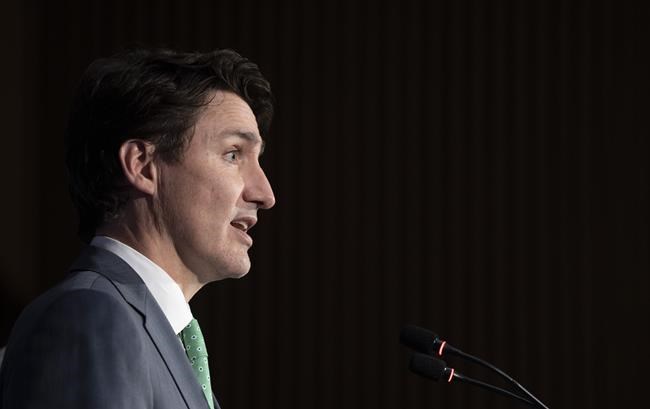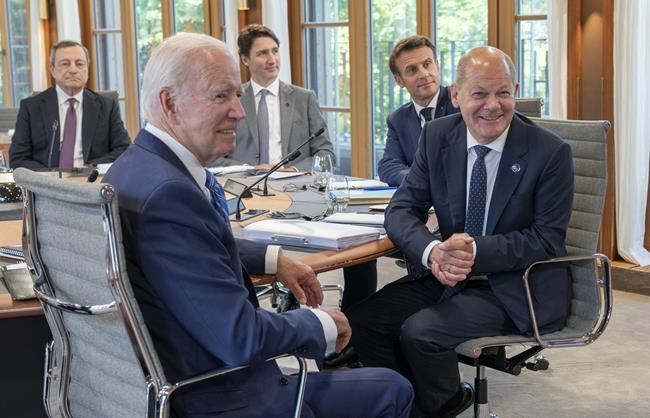Canada pledges funds as G7 develops response to famine fallout from Russian invasion
Advertisement
Read this article for free:
or
Already have an account? Log in here »
To continue reading, please subscribe:
Monthly Digital Subscription
$1 per week for 24 weeks*
- Enjoy unlimited reading on winnipegfreepress.com
- Read the E-Edition, our digital replica newspaper
- Access News Break, our award-winning app
- Play interactive puzzles
*Billed as $4 plus GST every four weeks. Offer only available to new and qualified returning subscribers. Cancel any time.
Read unlimited articles for free today:
or
Already have an account? Log in here »
Hey there, time traveller!
This article was published 26/06/2022 (981 days ago), so information in it may no longer be current.
SCHLOSS ELMAU, GERMANY – Canada pledged $50 million to prevent Ukrainian grain from going to waste on Sunday as Prime Minister Justin Trudeau committed to work with G7 nations on further measures to halt the famine caused by the Russian invasion of the embattled country.
The fallout of the ongoing Russian offensive dominated the first day of talks among leaders of the world’s most developed economies, who are gathered in Germany for three days worth of meetings.
Issues related to the invasion were the primary subject of a four-day summit among Commonwealth government leaders that wrapped up on Saturday in Kigali, Rwanda, and are expected to drive the agenda at the upcoming NATO Summit in Madrid, Spain, set to get underway on Wednesday.

A global grain shortage is currently threatening huge swaths of Africa with famine. Trudeau and other G7 leaders have pointed the blame squarely at Russia for targeting grain silos in Ukraine for attack and limiting exports by blocking major ports in the country.
The leaders’ first session on Sunday focused on the global economy at a time when conflict and unrest are driving up prices and access to key goods around the world.
In an announcement released the same day, Canada promised to ship grain storage equipment to Ukraine so it can store this year’s harvest and hopefully get it to market.
That would include mobile silos, Agriculture Minister Marie-Claude Bibeau said in an interview from Canada.
Other food storage has been impacted as well. Last week, in the Ukrainian port Mykolaiv, a vegetable oil storage facility owned by a Canadian-Dutch company, Viterra, was hit by a Russian missile strike.
“The Everi terminal handles vegetable oil used for 100% human food consumption,” said Jeff Cockwill, a Viterra spokesman based in Regina.
“Fortunately there were no fatalities, and we have confirmed one employee has suffered minor burns and has received medical attention.
Meanwhile Canada hopes to have 44 per cent more wheat production compared to last year, Bibeau said, noting the spike will boost supplies to the developing world as well as countries in the Middle East, Asia and Africa relying on Ukrainian grain.
She said the government and Canada’s grain producers are “all hands on deck” to get as much grain to developing nations facing hunger as possible.
Trudeau has promised more progress will be made during the G7 talks.
The Prime Minister arrived in Germany early Sunday morning. He was greeted at the airport in Munich by a musical welcome party, including former Liberal leader and Canadian Ambassador to Germany Stéphane Dion.
From there he boarded a helicopter bound for Schloss Elmau, a luxurious and secluded mountaintop retreat in the Bavarian Alps where the G7 summit is taking place.
His first stop was a bilateral meeting with British Prime Minister Boris Johnson, who remarked on the unity G7 nations have shown in the face of aggression against Ukraine.
G7 and other nations have closed ranks and issued sanctions against Russia since the February invasion and have collectively spent billions to send aid and arms to the embattled country.

But Russian President Vladimir Putin has retaliated by reducing access to his country’s natural gas supply in some European nations, including Germany, Europe’s largest economy.
At an an appearance hosted by German Chancellor Olaf Scholz and United States President Joe Biden, Trudeau reinforced the G7’s commitment to transitioning away from fossil fuels.
He did not speak about Canada’s position on relaxing regulations to ease the immediate crisis, and did not take questions, but said in Rwanda Saturday the leaders would need to discuss a solution.
“How we get there in the short term, how we build for the medium term, how we ensure that the long term is covered is exactly what we’re going to be talking about over the next couple of days. Not just with our fellow G7 leaders, but with leaders from around the world who will be joining us in Germany to tackle this very issue,” Trudeau said at a press conference in Kigali Saturday at the conclusion of the Commonwealth meeting.
India is not a G7 nation, but Scholz invited the country’s Prime Minister Narendra Modi to take part in the talks.
India, which has evolved as a growing market for Russian oil, abstained from a March vote at the United Nations to condemn Putin’s invasion of Ukraine.
Modi, meanwhile, opted out of attending the Commonwealth Summit and instead met virtually with leaders from Russia, China, Brazil and South Africa.
Trudeau said he’s spoken to Scholz about the need to invest in infrastructure to help wean Europe off of Russian oil, adding Canada can be part of the solution.
Ukrainian President Volodymyr Zelenskyy is expected to address the G7 leaders on the second day of the summit.
This report by The Canadian Press was first published June 26, 2022.
— With files from Marie Woolf in Ottawa



